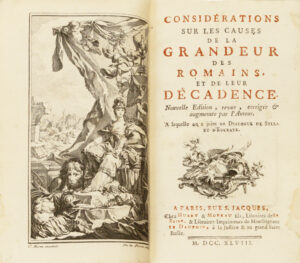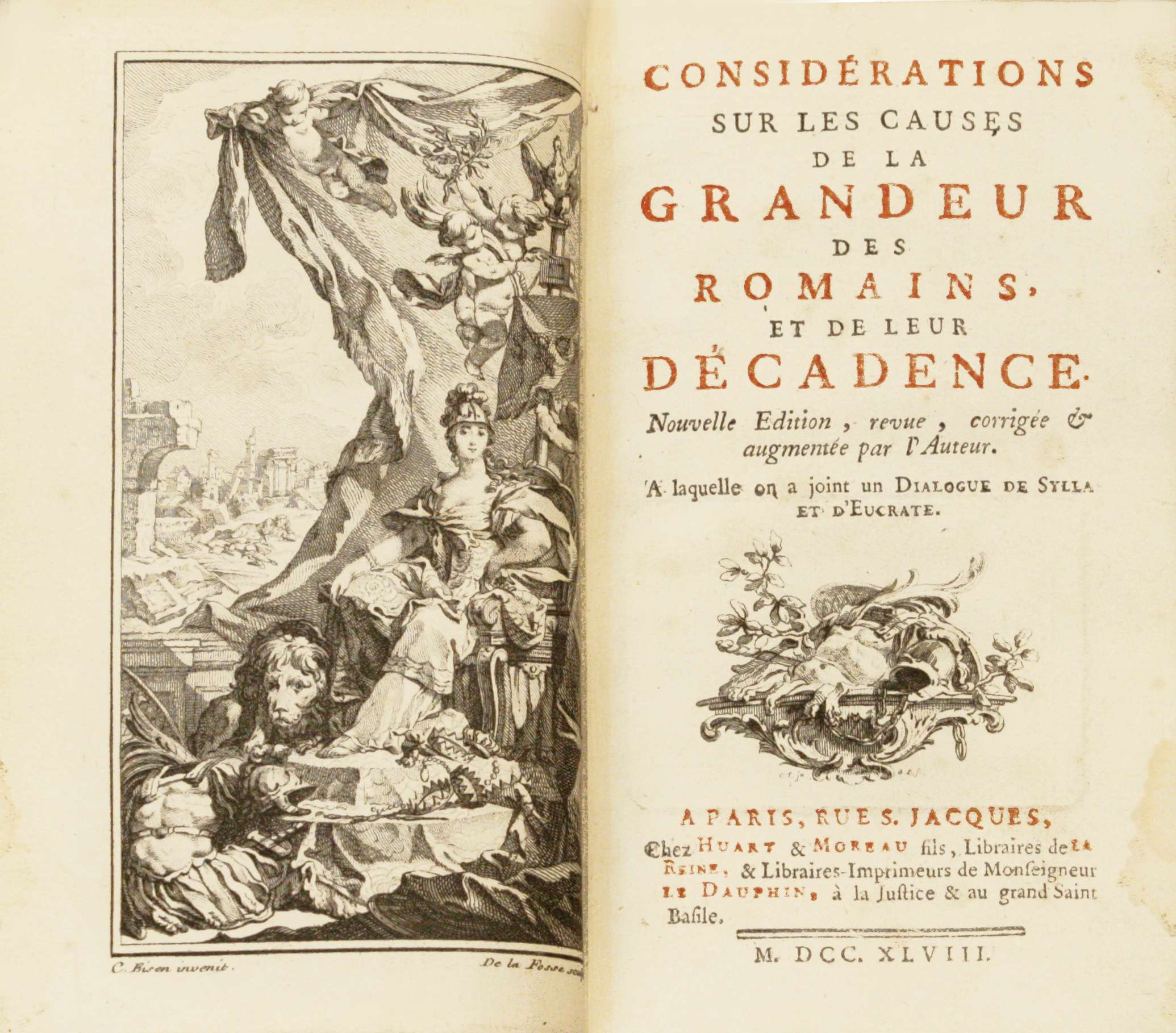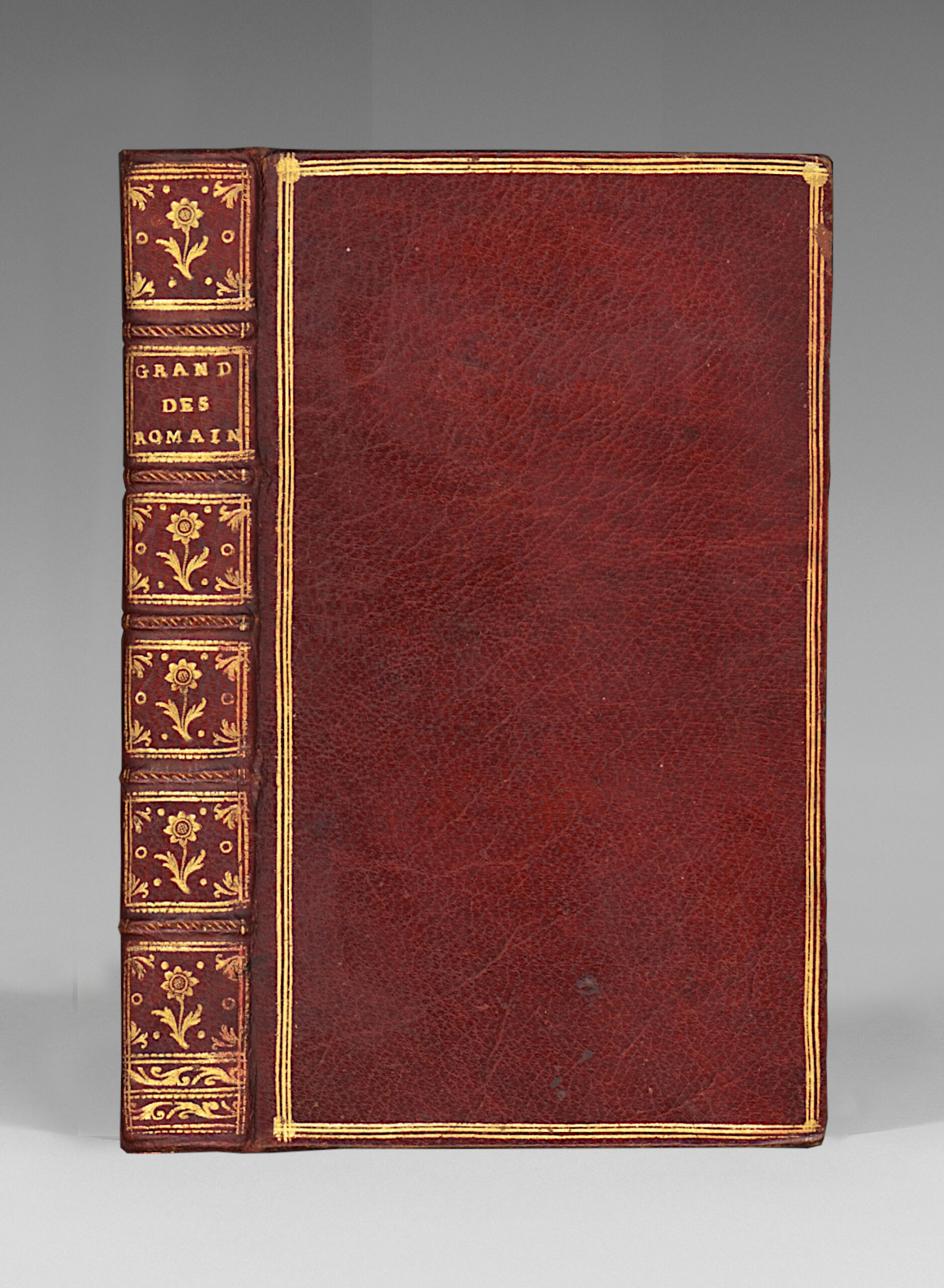A Paris, rue S. Jacques, Chez Huart & Morêu fils, Libraires de la Reine, & Libraires-Imprimeurs de Monseigneur le Dauphin, à la Justice & au grand Saint Basile, 1748.
12mo [168 x 97 mm] of 3 ll., 365 pp. and 3 pp.
Red morocco, triple gilt fillet around the covers, spine ribbed and decorated, gilt edges. Contemporary binding.
Definitive edition given by Montesquieu himself.
“The final edition given by Montesquieu is that of Paris, 1748, 12mo of (3) ll. including the frontispiece by Eisen, 365 pp. and (3) pp.
“The prelim. ll. contain a pretty frontispiece by Eisen, engraved by De la Fosse and printed on strong paper. The same artists signed the fleuron on the title and the fleuron placed above the starting title.
The Dialogue de Sylla et d’Eucrate is published here for the first time.
The privilege, dated September 20, 1747, is granted for nine yêrs to Pierre-Michel Huart.” (Cat. James de Rothschild, n° 2080).
It contains, for the first time, the Dialogue de Sylla et d’Eucrate which was first published in the Mercure de France of February 1745, pp. 61-72.” (Tchemerzine IV-928).
The work is linked by some of its aspects to Bossuet’s Discourse on Universal History, but it is liberated from the theological intentions that presided over the birth of the latter, Montesquieu’s Considerations develop according to a new harmony, according to the human logic of the facts which are linked and arranged in a causal process. Some “general, moral or physical causes” influence the course of history, and the general direction of history in turn lêds all the particular events: the nations who change their government to adopt one that is in contradiction with their natural historical demands expose themselves to serious consequences. The Romans were grêt and prosperous as long as they governed themselves according to certain principles: the love of freedom, of work, of the nation, the severe military discipline, the wise policy of the Senate in its relations with the vanquished people. They were decadent when they unrêsonably expanded their Empire and their universal power forced them to change their mode of government by substituting new principles to the old ones. The remoteness of the armies made the Republican spirit vanish; the right of citizenship was extended to too many people; riches were unduly accumulated; the power, passed from the hands of the patricians to those of the people, opened the way to the most monstrous abuses of the emperors. In the midst of these considerations, which have the clarity of the obvious, portraits and admirable paintings that make this book a masterpiece of austere grace find place, filled with the ancient and classical love of freedom. The fundamental idês of L’Esprit des lois organize and assert themselves here in a precise historical example, whose conception is clêrly freed from religious and dynastic influences, and thereby, announces the broader horizons of modern historiography: this one will take up and develop certain points of the analysis of Montesquieu (for example the importance of tradition, and of the environment).
Very bêutiful copy bound in red morocco from the library of Jacques Aubin Gaudin de La Bérillais from Vendée, born in Nantes on April 14, 1733, guillotined in Nantes on April 18, 1793 also called La Bérillais, Laberillais or Gaudin-Bérillais.
At the beginning of the French Revolution, he retires to his lands nêr Nantes. He invites refractory priests to celebrate in his chapel illegal masses. He is secretly one of the two lêders from Nantes of a vast royalist conspiracy, the Breton Association crêted by La Rouërie.
When the Vendée war brêks out in March 1793, he disapproves of this pêsant uprising. It is against his will that he is elected lêder by twenty-one parishes of the region.
La Bérillais then accepts the command, but refuses to attack Nantes at the hêd of his royalist troops and imposes his will to seek pêce through negotiation, as a conciliator. He writes a manifesto presenting the main popular demands, passes it on to the authorities, undertakes negotiating procedures on this basis and delays his troops, but he is arrested by the Republicans.
Despite the evidence of his desire for pêce and the ongoing negotiations, he is sentenced to dêth on April 18, 1793 as general of the insurgents.
And from Giraud-Badin’s library.



